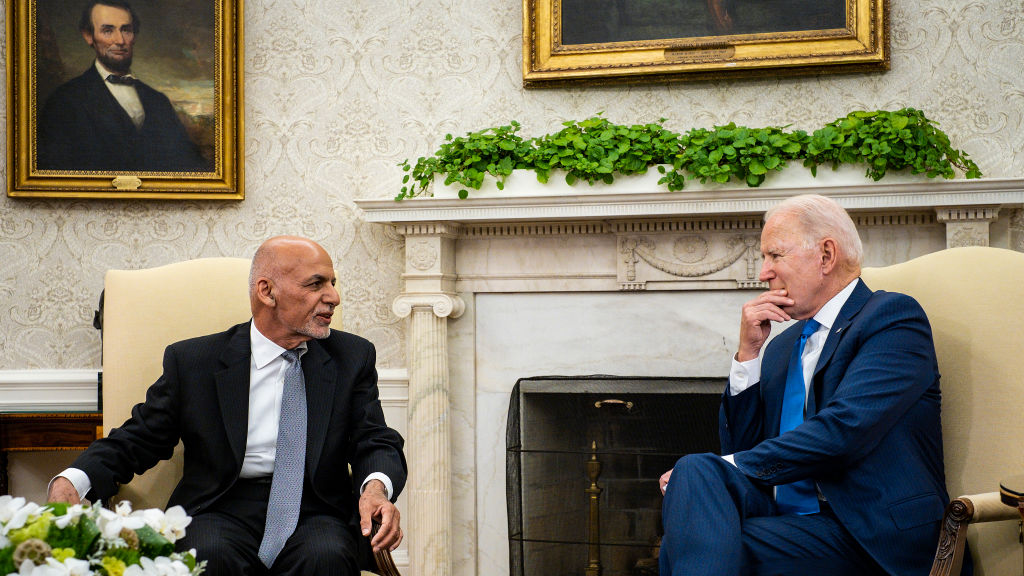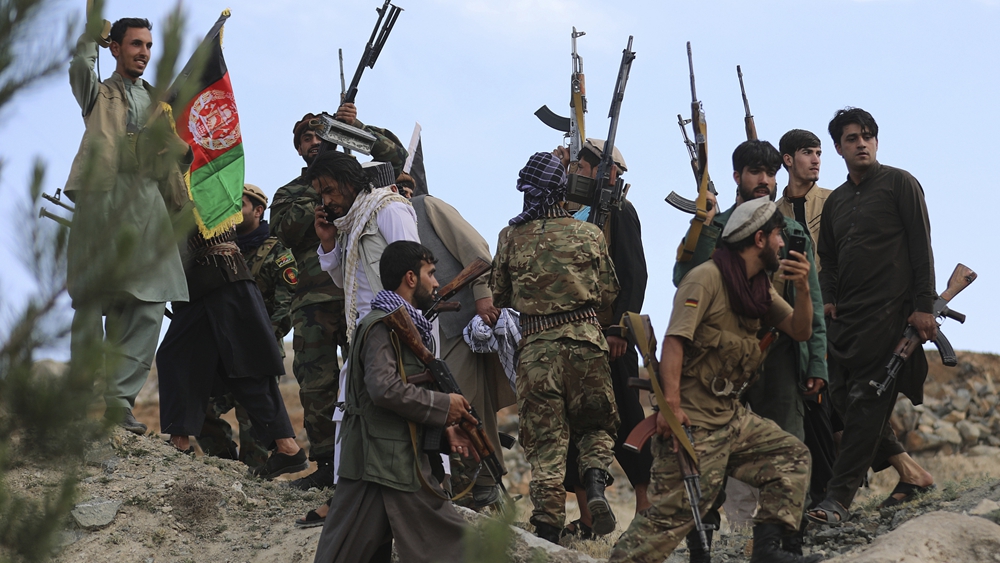
U.S. President Joe Biden (R) meets with Afghan President Ashraf Ghani in the Oval Office at the White House in Washington, D.C., U.S., June 25, 2021. /Getty
U.S. President Joe Biden (R) meets with Afghan President Ashraf Ghani in the Oval Office at the White House in Washington, D.C., U.S., June 25, 2021. /Getty
Editor's note: Abu Naser is an independent researcher on Asian Affairs, especially on China. The article reflects the author's opinions and not necessarily the views of CGTN.
Empire after empire, nation after nation, whether it was medieval Mughal or contemporary United States, have failed to set their footsteps permanently in this naturally fortified and strategically crucial country - Afghanistan.
But the underlying reasons behind Empire's dusting down on the ground of this "graveyard" were not necessarily for the jagged nature of its land or the tribal tendency of its people, rather for resorting to the wrong tactical tools those empires applied to pacify this piece of land.
The United States, having borne the same historically determined fate, has been withdrawing its troops from Afghanistan and drawing an end line to its longest war.
Although the U.S. initially achieved its core goal of pulling down al-Qaeda's sanctuary and ousting the Taliban from power, it ultimately failed to complete its self-styled mission against terrorism and the democratization of Afghanistan due to its long-held misconceptions about Afghanistan, an incoherent Afghan strategy and longstanding wrong tactical tools.
As a result of its disruptive and incoherent strategy and the sudden withdrawal of its troops without ensuring a minimum power-sharing agreement between the Taliban and Afghan government, the country has again fallen from bumpy ditch to dark hole of uncertainty. And this uncertainty remains and exacerbates the risks of languishing between simultaneous peace-talks and intermittent fighting or outright civil war between the Taliban and the Kabul government.
But beyond these clouds of uncertainty, there is also a silver lining of hope for a permanent peace deal among the stakeholders and the subsequent outcome of a sustainably stable Afghanistan.
Of-course here lies a big "if" regarding the prospect of minimum power-sharing consensus between the Taliban and the Afghan government. The lingering power struggle among internal stakeholders, the complex and overlapping geostrategic interests of major players and the presence of remaining pockets of terrorist groups such as Al-Qaeda in Khorasan may delay the long-cherished peace deal.
But even bigger than this big "if" are two other questions: whether countries with contradictory geostrategic interests are ready to set their bitter rivalries aside to reach their long-desired goal of a tranquil Afghanistan and Central Asia, and what is the best tactical tool to push a minimum peace negotiation to permanently stabilize Afghanistan.
But the U.S.' continuously simmering geopolitical rivalry against China and subsequent band-wagoning to contain the latter have gradually been blurring the prospect of any strategic synthesis in the near future. There is a big gulf between Afghan strategies pursued by China and the U.S.
The whole U.S.-Afghan strategy has revolved around counterterrorism measures, except for some half-hearted infrastructural development initiatives such as TAPI, CASA-1000 and other U.S.-backed connectivity projects.

Afghan militiamen join Afghan defense and security forces during a gathering in Kabul, Afghanistan, June 23, 2021. /CFP
Afghan militiamen join Afghan defense and security forces during a gathering in Kabul, Afghanistan, June 23, 2021. /CFP
On the other hand, since 2011 China has started to pay more attention to Afghanistan and has included Afghanistan into its Belt and Road Initiative (BRI) transport corridor project especially through the extension of the BRI flagship project the China-Pakistan Economic Corridor (CPEC).
Especially since the 2014 Istanbul Process and in 2016 Afghanistan's formal accession into the BRI and the Asian Infrastructure Investment Bank (AIIB), China has reinvigorated its efforts to mediate in striking a minimum peace deal between the Taliban and the Kabul government and forward its footsteps in Afghanistan through connectivity, trade and ultimately pave the way in Afghanistan to a path of prosperity, as well as promoten its own security interests. But alone and without permanent peace in Afghanistan, this seems near impossible.
Both China and the U.S. share the same vision regarding Afghanistan - more connectivity, more trade, more prosperity and more stability. And the prevailing civilian and economic realities of Afghanistan, in which about 40 percent of its population is young, more than 25 percent are unemployed, and around 60 percent of its revenue comes from external aid (with the possibility of gradual dwindling due to the U.S. and NATO withdrawal), has made a prosperity-oriented initiative for establishing peace more imperative for Afghanistan.
Being optimistic about the minimum peace in Afghanistan, it is naïve to imagine a perpetually peaceful and well-destined Afghanistan without enhancing the economic prosperity of the country and its people through connectivity, trade and investment.
But the biggest question lies here: How much are both, along with their strategic partners, ready to set the rivalry aside to realize this vision? Recent declassified documents demonstrate that whole Indo-Pacific strategy taken by the U.S. along with like-minded countries manifests with a mission to contain its strategic rival, China.
The wholesale application of an Indo-Pacific strategy pursuing wholesale opposition to whatever China initiates rather than taking a corrective and cooperative stance will certainly push the Afghan crisis toward further cataclysm. If the U.S. upholds the same zero-sum tendency toward China regarding peace and stability in Afghanistan, then reaching the shared vision of stability through infrastructural connectivity and economic prosperity in Afghanistan will continue to be unattainable for even longer, if not forever.
(If you want to contribute and have specific expertise, please contact us at opinions@cgtn.com.)

